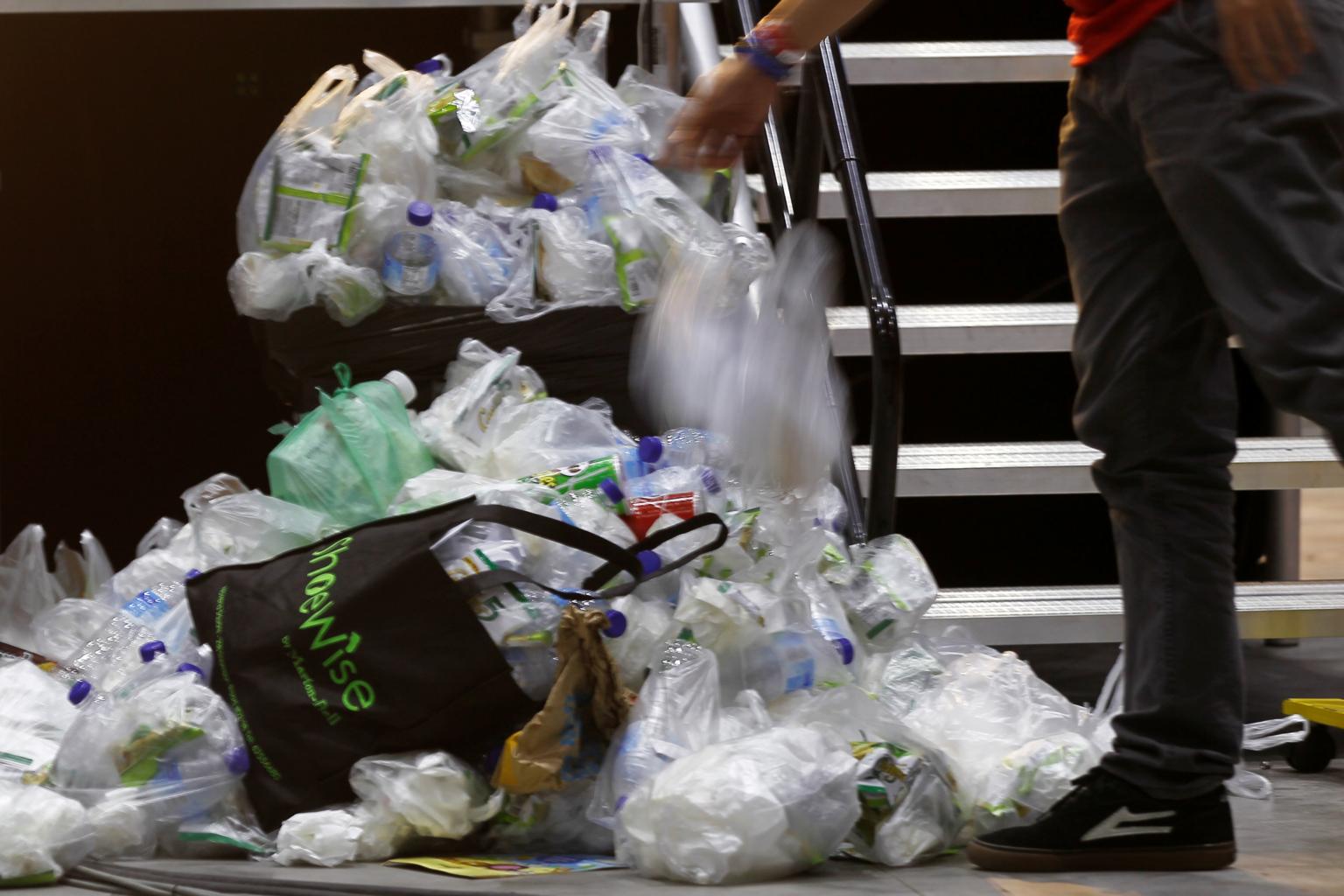Seven in 10 Singaporeans unaware of which plastics can be recycled
Sign up now: Get ST's newsletters delivered to your inbox

Singapore uses at least 1.76 billion plastic items a year, or almost one item per person per day. The bulk of these are plastic bags taken from supermarkets.
PHOTO: REUTERS
SINGAPORE - Non-polystyrene takeaway containers can be recycled after being emptied and rinsed, but styrofoam ones should not be thrown into the blue recycling bins in Singapore.
However, most Singaporeans are not fully aware of such guidelines and which kinds of plastics can or cannot be recycled.
This lack of knowledge is why the bulk of plastic products are disposed of as general waste, a new report by the Singapore Environment Council (SEC) has shown.
The Consumer Plastic And Plastic Resource Ecosystem In Singapore report, which was released on Thursday (Aug 30) at the SEC Annual Conference, also showed that four in 10 cited inconvenience as a reason for not recycling.
This was in addition to the seven in 10 who indicated that they did not fully understand what plastics to recycle. More than 20 per cent also said they were not aware of the location of the nearest recycling bins.
To tackle the issues, the SEC, a non-governmental organisation (NGO), has spelt out six recommendations to help improve Singapore's plastic recycling rate, which is only at 6 per cent, poorer than other materials like paper and cardboard, at 50 per cent.
They include giving companies that specialise in recycling technology the opportunity to operate in Singapore.
The council also suggested that public sector organisations and NGOs partner major packaging-waste industries - such as food and beverage - to reduce the use of plastic packaging.
Another recommendation is to build a market for recycled plastic through innovation, such as using recycled plastic to support major manufacturing segments in Singapore, like the biomedical and electronics industries.
"In Singapore, our plastic ecosystem is mostly linear, which means that plastic goes from producers to consumers, to the waste bin," said the council's executive director Jen Teo.
"This places a strain on our waste management systems as well as uses up an enormous amount of natural resources," she added.
Ms Teo said the study shows that there are already existing technologies to convert plastic to fuel, and even use recycled plastic for 3D printing.
For the report, which was commissioned jointly with Deloitte & Touche Enterprise Risk Services, 1,003 Singaporeans were surveyed from last December to May this year.
Despite the lack of awareness on which plastics can be recycled, the poll found that 45 per cent of respondents wanted more information on the matter, suggesting that they do want to recycle.
Environment and Water Resources Minister Masagos Zulkifli said that the council's effort to fight plastic waste, and its call for individuals to use one less plastic item a day, are commendable, and he hopes the public will rise to the challenge.
Mr Masagos said the Government is studying the feasibility of extending the Extended Producer Responsibility (EPR) approach to plastic and packaging waste.
The EPR approach will apply to producers of electrical and electronic equipment by 2021, and they will have to ensure their products are collected and recycled or disposed of when they reach the end of their lifespan.
He added that the National Environment Agency also recently launched a research grant call for the sustainable design of plastic materials, with the aim for plastics to be made more reusable, easier to recycle and to extract value from waste plastics.
Mr Emmanual Tay, who runs Eco Innovative, a company which helps clients monitor and analyse their waste data, said that when recyclable plastic is contaminated by food waste, it is difficult to recycle.
Recyclable plastic is usually collected, baled, and sent overseas, in a process which takes weeks. But if it is contaminated, there may be decomposition and health issues, Mr Tay added.
"Plastic collectors in Singapore are specific in the type of plastics they can recycle and they can accept," he said.
During the SEC Annual Conference, held at the One Farrer Hotel and Spa, 14 companies and organisations were also recognised for their sustainable business practices, as part of the 21st annual Singapore Environmental Achievement Awards.
The top award went to technology firm HP PPS Asia Pacific, which is working with suppliers to replace wood pallets used to ship its products with straw ones. This opens up a market for straw waste and also reduces air pollution from burning unwanted straws, the SEC said.


